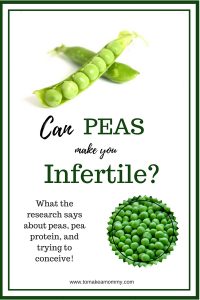
This post has been medically reviewed by Dr. Sarah Mathis, D.O.
When I was trying to conceive, I came across an article saying that peas were bad for fertility. I found another saying that peas caused infertility! I googled a little more and found that m-xylohydroquinone, which is a natural chemical found in peas used to be used as a contraceptive.
I’m not a huge fan of peas, and they aren’t terribly nutrient dense, so without further research I decided that was one easy thing to eliminate from my diet.
Fast forward to today and we’ve got a big problem for health-conscious ladies trying to get pregnant- there is frigging pea protein everywhere! It seems like all the health food companies caught on that people didn’t want soy protein or proteins that come with lots of sugar, and so they are packing everything with pea protein! Many of my readers who are already trying to avoid dairy, gluten, soy, and more (read about the fertility diet that helped me get pregnant after infertility here), are coming across products with pea protein and are wondering if its safe!
Also, many of my readers are avoiding meat and eggs for personal reasons, and it can be very hard to find a good, complete protein without meat and eggs. Pea protein is pretty complete protein. So it isn’t as easy for them to write off peas from their diet. But do you want to be eating food packed with a contraceptive when you are trying to get pregnant?
And protein is VERY important for fertility- you can read my post on optimal protein/fat/carb macro balance for the fertility diet according to recent research. You need your protein.
So, as the ladies in my Facebook group often debate, are peas REALLY that bad?
Okay, I finally did it. I bit the bullet, and I dug knee-deep into the research. And contrary to what some might say, there are a heck of a lot of studies on peas and fertility.
All the research happened because for a short while mid-20th century scientists thought that peas were going to be the cheap contraceptive that would make birth control easily accessible across the world. Now, the studies stop in the 1960s. This is because at this point they realized that peas were only about 60% effective as a contraceptive– and that just isn’t good enough for people trying to avoid getting pregnant.
BUT– what about us? Those of us TRYING to conceive? Well, things are a bit unclear. BUT, this is real science- it is just old. But it’s real.
I’m going to go through all the research and then at the bottom of this post I’m going to give you my bottom line conclusions.
Table of Contents
The Research on Peas as Contraceptive and their effects on Fertility
- The active substance m-xylohydroquinone was located in the oil of the seeds of the field pea (the seeds are the peas) and isolated in its pure state. They experimented on rats and showed that it can interfere with progesterone and prevent the implantation of a fertilized ovum (much in the way the kinds of birth control pills that have estrogen and progesterone do). (Saanyal, 1956).
- Studies of large groups of women showed 60% reductions in pregnancies. Male sperm counts diminish (but return after 4 days of stopping use). Researchers are very excited about possibility as birth control. (Sanyal, 1959) (this link has disappeared from the interwebs, but is referenced in this article)
- 50% reduction in pregnancy rates when men take m-xylohydroquinone (the natural chemical found in peas). The researchers were hopeful this will be a cheap way to manage fertility in poor overpopulated areas. (Sanyal & Rana 1959, abstract on page 330 of link, extrapolation on page 331)
- Although m-xylohydroquinone may reduce male fertility, don’t worry boys, studies on rats showed no adverse effect on libido or on the genital organs. (Kar, Bose & Das, 1962).
- Sanyal decided to research peas as a contraceptive after discovering that the population of Tibet remained static, i.e., did not increase, for 200 years, during which time peas were a major source of dietary protein. I can’t find abstracts for all of Sanyal’s articles, but there were many. He is cited here many times in this research paper for the World Health Organization on Fertility regulating agents from plants. (Soejarto, Bingel, Slaytor, & Farnsworth, 1978)
- I can’t find the research articles for this, but a Washington Post story suggests that studies showed that when mice were fed a diet of 20% peas, litter sizes dropped in half. At 30% peas, the mice failed to reproduce at all. (Rensberger, 1994)
- Some ecologists speculate that peas only produce birth control like substances when the climate is rough (too cold, too dry, etc.) to protect themselves from being over consumed out of existence. Or maybe (my speculation), it is God naturally protecting a starving people from producing babies they can’t feed. The ecologists suggest that during optimal conditions, when peas are abundant, they would only produce small amounts of the birth-control like substance. Fascinating! Speculation from Wold Stori in “The Curious History of Vegetables” of which part is available on Google Books (source p 200-201).
Are Peas Really Linked to Infertility?
Okay, here are my thoughts on the research about peas and fertility, and how we can use it to make informed decisions while trying to conceive, especially when pea protein is everywhere noawadays.
1- Yes, this research is old. That isn’t a reason to ignore it. The reason there isn’t any new research on it is because all the scientists cared about was m-xylohydroquinone as a contraceptive. It was only shown to be about 60% effective, so they stopped researching it and started researching more effective things. For people trying to not get pregnant, no one wants to take a pill that is only 60% effective.
2- What kinds of peas are we talking about? It turns out that when people say “peas” they mean wildly different things. You and I probably think of the little green peas that you can buy organic and frozen in a bag. Our parents think of gross mushy green peas from a can. But “peas” can also mean- snow peas, “field” peas, yellow split-peas, or black-eyed peas. Here’s the deal: the studies were done on m-xylohydroquinone which came from Pisum Sativum (the common field pea). Unfortunately, all types of peas, including sweet green peas and yellow split pea are cultivars of Pisum Sativum. Even more unfortunate is that the pea protein being used today is generally made from “field peas” because they are higher in protein than sweet green peas. So basically, pea protein is being made with the same cultivar as they used in the research. Because its cheap and protein dense.
3- The contraceptive effect of m-xylohydroquinone was shown in WOMEN AND MEN.
4- So what’s a couple to do when trying to get pregnant? In my opinion, if you want to occasionally have some sweet green peas in a salad, or a bowl of yellow split peas, it is probably fine. And, if you are super young and fertile, its probably okay. BUT, for women (or men) like me who have multiple infertility diagnoses and really have the odds stacked against us- why would we risk it? When we try to conceive again, I will avoid all peas and pea proteins. I will ask my husband to do the same. Of course, we both eat meat and eggs and as such have ample complete protein sources.
5- If you are a vegan and are having a hard time finding alternative sources of protein after having eliminated soy, meat and eggs, try beans and lentils. If your gut can’t handle beans and lentils, then you are quickly running out of protein options, especially if you want to keep your protein macro high (check out my post on why that is so important for fertility). So, do what you must. In the end, you need to decide for yourself what is going to help you be your healthiest and most fertile self!
6- We need more research. And we need someone to find out for us if m-xylohydroquinone is in the pea protein that companies are packing into everything from pasta to protein bars. Because we have no idea if that natural chemical that they isolated from peas for the research is actually still in the pea protein after whatever modern processing they do. Maybe it isn’t, and its all totally fine. Can some scientist with a lab figure this out for us?
My Bottom Line on Peas when Trying to Conceive
When I try to conceive again I will avoid all peas and pea proteins and I will ask hubby to do the same. Do what YOU think is right after reviewing this research!
Remember, there is plenty of protein in the world without eating peas and pea protein. And you can eat them again after you get pregnant! Or disregard the research and eat them. I’m not a doctor or a laboratory, and I have no test results for amounts of m-xylohydroquinone in anything!
Alternatives to Pea Protein When Trying to Conceive
If you are trying to bulk up your fertility smoothie (or his fertility smoothie) for your macros, here are some alternatives to pea protein powder.
For most women, here are the kinds of protein powders I like:
- Collagen Peptides– This is what I use now and love. I conceived my second miracle while using collagen, used it throughout my second pregnancy, and continue to use it while breastfeeding. It is thought that the collagen peptides can provide the same kind of nutritional boost and gut-healing that you get from bone broth. There are studies showing collagen helping with bone health, weight loss, diabetes, circadian rhythms, improve mood, boost your arterial health, make your skin and hair look great, and improve gut health. (Don’t forget to take an awesome probiotic to help also). I actually do my own daily bone broth ALSO for these benefits. There are no organic free range collagen peptides available on the market. After the scandals with heavy metals in many of the collagen peptide lines, there is now only one collagen peptide brand I use and recommend- Perfect Supplement’s Hydrolyzed Collagen. Their shared current labs with me and they test for heavy metals and pesticides. They also happen to be much more affordable than the more popular brands that have had issues with heavy metals. They also have the only Organic Bone Broth Protein powder that I am aware of that has no other fillers (plus its tested for heavy metals and pesticides). —> Get your Collagen Peptides Here and use code ANNA10 for 10% off your first order! Grab their awesome Acai, safety tested Spirulina, and Resveratrol while you are there.
- Plant-Based Protein for Fertility: Once you start looking for a vegan protein powder for fertility, things get dicey quickly. Soy is potentially estrogenic- ditch. Pea protein is linked to infertility– ditch. Oh look, this one is great . .. never mind it is stuffed with random fillers and sugar. Oh, I finally found a clean one, and boom . . . it has heavy metal contamination from processing. No worries, dear reader, I have finally found an ideal solution:- Perfect Supplements makes a pure, organic plant protein made from pumpkin seeds, hemp seed, and sacha inchi seed. AND, Sacha Inchi seeds are linked to boosting fertility. AND Perfect Supplements tests every batch for pesticides, heavy metals, and allergens. AND they are affordable. Problem solved. Phew! For Perfect Supplements Perfect Plant Protein use the code ANNA10 for 10% off every order!
When shopping for plant proteins, be sure to read the ingredients carefully and make sure nothing sneaky is in them. Things to look out for include: sugar, other sweeteners, soy, pea protein, artificial colors or flavors, anything non-organic that might have been sprayed with pesticides, gluten, and milk ingredients. It’s also better to avoid any vegetable oils that might give you too much Omega 6, and watch your intake of thickeners like xanthan gum or guar gum.
Just be aware that some veg protein powders have been found to have heavy metal contamination from processing, so keep your eye on the news!
Want to get pregnant fast?
Love lists? Me too. Grab my 79 Things I did to transform my life and get pregnant in less than 3 months after 2 years of infertility and miscarriages! Totally free!
Anna Rapp is a fertility journalist and non-toxic living expert. When Anna Rapp was struggling with infertility and recurrent early miscarriage, she was diagnosed with diminished ovarian reserve, High FSH, low AMH, low follicle count, endometriosis, and an MTHFR mutation. Despite being told donor eggs were her only solution, Anna used her graduate training in research methods and analysis to read everything she could find on fertility and egg health. Ultimately, she lowered her FSH and got pregnant naturally (twice). She blogs about how she did it and encourages her readers to take charge of their fertility journey and get happy, healthy, and pregnant!


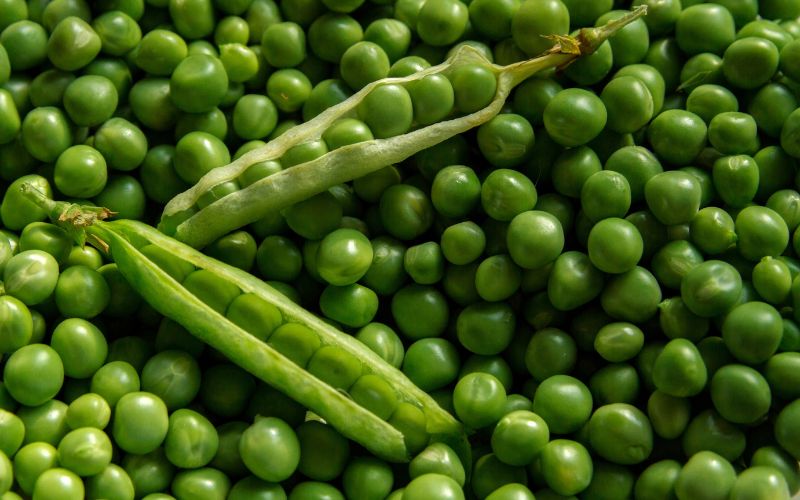
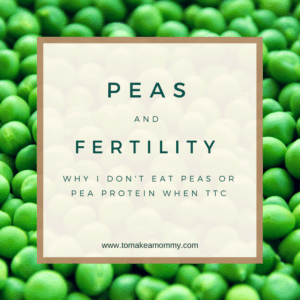
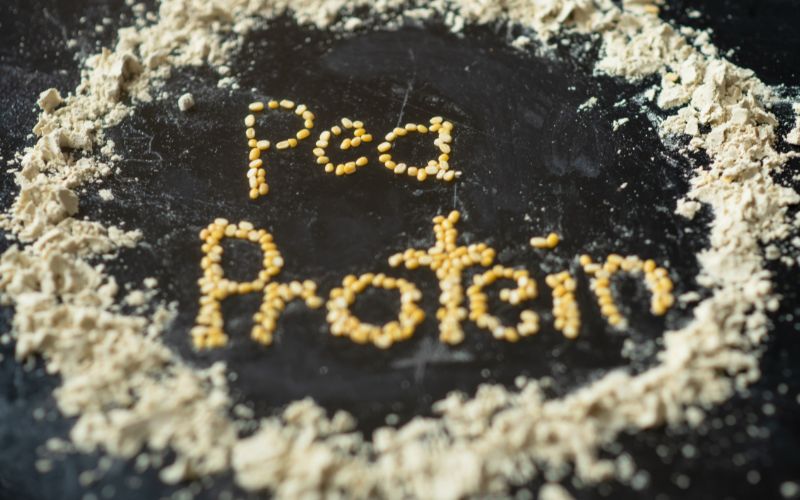
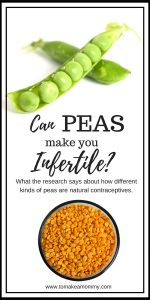
Omg thank you for posting this. I’ve been using a Pea protein powder for my smoothies for a few months now and I had no idea. Like you said, why take the chance! I will switch over to the collagen, my husband uses that anyways so it’s already in the house! As always, thanks for being an amazing source of information!
Keep the pea protein for when you get pregnant 🙂 No need to throw it away!! Enjoy the collagen, its pricey but so good!!
Hi Anna, this has been such an informative post. Thank you for your diligent research!!! We follow a Paleo diet and wondered what you thought of the Sacha Inchi protein powder?
Hi Pippa! This is the first I’ve ever heard of Sacha Inchi!! Looks cool, but I have never heard of this before seeing your post! I’ll find out what I can!! Is it Paleo approved?
Oh wow
My AMH is low already and I’ve been drinking smoothies with pea protein milk.
But remember, the effects of it were easily reversible! So just switch proteins and you’re good!
Wow Anna, I had no idea peas could cause infertility. They’re so small I would never have really thought they could do anything besides rolling off your plate at inconvenient times!
Hahahaha you are too funny, Sarah!!! And, to be clear, I’m not saying peas cause infertility. But I am saying that I have concern about peas- especially concentrated peas ingested in large amounts- and their past history as contraceptives!!!
Hi Anna!
I’m not sure if my first comment got thru because I haven’t seen any notification that it was sent or not. So I’m writing another comment. My concern is… what if the xanthan gum or guar gum is found in shampoo? I was looking for a shampoo in one of our local stores that sell natural products. I saw in the label that it has xanthan gum and guar gum. You article mentions not to consume food with this ingredient. But that’s food. What about a shampoo?
I read the article about peas and pea protein and it’s very interesting! I never knew about it! Do you know if chickpeas/ garbanzo beans are in the same category as peas or beans in this fertility inhibitor? Thanks for all your articles- I’m enjoying them all!
I have the same question. What about chickpeas?
Chickpeas are fine, totally different!
A little reality check from a biochemist.
m-xylohydroquinone is extracted from pea oil, not pea protein
pea oil is about 1% of the composition of peas. m-xylohydroquinone is a very small fraction of the composition of pea oil.
It’s not humanly possible to eat enough peas to get a dose of m-xylohydroquinone needed to show contraceptive effects. not all studies showed contraceptive effects and the ones that did needed HUGE doses and the amount of peas required to make those doses of m-xylohydroquinone are too high to be obtained from dietary intake of peas or pea protein (peas are about 30% protein) to reach potentially contraceptive doses.
Enjoy your peas and pea protein!
Oh man this is so helpful!!! Can you please email me so we can talk about this? I would love to update the post–as I’m sure you read in my blog post I say that I couldn’t find what part of the pea the m-xylohydroquinone was extracted from, and that we couldn’t know for sure. This would be such a relief for so many!! I think you left a fake email address, but if you get this or see this, please email me! I could update the article and even cite you! [email protected]
Hi Anna, were you able to get to the bottom of this?
No! Some cranky person left a comment suggesting that the ingredient is not in pea protein powders, but they left a fake name and email so I don’t know if its legit? I had one person who had a scientist husband reach out to me, but in the end they were unable to do testing. Hopefully we’ll have an answer in the next few years!
My fertility doctor highly recommends the product Ripple as a dairy alternative. After reading your article I’d like to let him know the correlations!
Let me know what he says! Also pea protein milks have high glyphosate residue usually, I’d skip the ripple for sure.
I was diagnosed with endometriosis and endometriomas (ovarian/chocolate cysts). I had one cup of pea protein and immediately bleeding during my luteal phase last month!!! I felt so frightened that I did lots of researches. Finally I just figured out pea can inhibit progesterone receptor!!
As you mentioned: “if you are super young and fertile, its probably okay. BUT, for women (or men) like me who have multiple infertility diagnoses and really have the odds stacked against us- why would we risk it? ” Yep, it is true!!
(Google:
Effects of phytoestrogen extracts isolated from rye, green and yellow pea seeds on hormone production and proliferation of trophoblast tumor cells Jeg3)
I was diagnosed with endometriosis and endometriomas (ovarian/chocolate cysts). I had one cup of pea protein and immediately bleeding during my luteal phase last month!!! I felt so frightened that I did lots of researches. Finally I just figured out pea can inhibit progesterone receptor!!
As you mentioned: “if you are super young and fertile, its probably okay. BUT, for women (or men) like me who have multiple infertility diagnoses and really have the odds stacked against us- why would we risk it? ”
Yep, it is true!!
(Google:
Effects of phytoestrogen extracts isolated from rye, green and yellow pea seeds on hormone production and proliferation of trophoblast tumor cells Jeg3)
Sammi